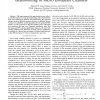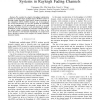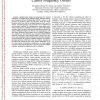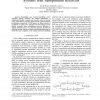ICC
2007
IEEE
15 years 8 months ago
2007
IEEE
Abstract— This paper proposes the opportunistic power allocation (OPA) scheme for random beamforming with a limited feedback rate. Without the channel state information, the prop...
108
click to vote
ICC
2007
IEEE
15 years 8 months ago
2007
IEEE
— In this paper, we consider a 2-hop wireless diversity relay network. We explore transmit power allocation among the source and relays to maximize the received signal to noise r...
100
click to vote
ICC
2007
IEEE
15 years 8 months ago
2007
IEEE
—We consider the adaptive throughput optimization problem for multiple-input multiple-output (MIMO) systems in Rayleigh fading channels. With perfect channel knowledge at the tra...
109
Voted
ICC
2007
IEEE
15 years 8 months ago
2007
IEEE
— This paper develops linear precoding schemes for the downlink in multiuser multiple-input multiple-output (MIMO) orthogonal frequency division multiplexing (OFDM) systems with ...
122
Voted
ICC
2007
IEEE
15 years 8 months ago
2007
IEEE
—Since the provision of both unicast and multicast services is expected for the next generation of multi-carrier wireless systems, the allocation of resources for this combinatio...
114
click to vote
GLOBECOM
2007
IEEE
15 years 8 months ago
2007
IEEE
— Optimal pilot design and placement for channel estimation in Multiple-input Multiple-output (MIMO) Orthogonal Frequency-Division Multiplexing (OFDM) systems in the presence of ...
103
click to vote
GLOBECOM
2007
IEEE
15 years 8 months ago
2007
IEEE
— Waterfilling and mercury/waterfilling power allocation policies maximize the mutual information of independent parallel Gaussian-noise channels under an average power constra...
112
click to vote
GLOBECOM
2007
IEEE
15 years 8 months ago
2007
IEEE
— The design of spatio-temporal power allocation schemes is considered for space-time coding over spatially correlated multiple-input multiple-output (MIMO) channels. The focus i...
113
click to vote
VTC
2008
IEEE
15 years 8 months ago
2008
IEEE
—Multiuser orthogonal frequency division multiplexing (MU-OFDM) is a promising technique for future wide-area mobile communications, which can provide scalable high data rate tra...
118
click to vote
VTC
2008
IEEE
15 years 8 months ago
2008
IEEE
—The concept of Virtual Antenna Array (VAA) is a promising approach to apply MIMO concepts in relaying systems. In order to fulfill a given Quality-of-Service (QoS) requirement ...




